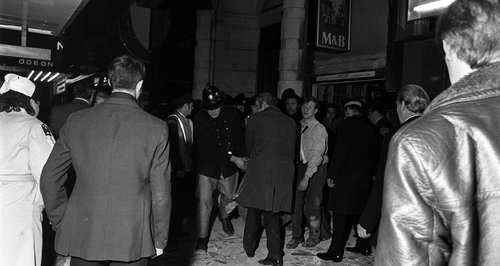Leading Pathologist Says Birmingham Pub Bombing Victims Had "Unsurvivable" Injuries
13 March 2019, 18:54

All 21 victims killed in the IRA pub bombings in Birmingham had "unsurvivable" injuries, a leading Home Office pathologist has told inquests into the deaths.
Dr Nat Cary said the wounds sustained by victims of the blasts on November 21 1974 were "absolutely typical of an explosion".
Professor Jon Clasper, a defence professor in trauma and orthopaedics from the Centre for Blast Injury Studies (CBIS), described the emergency care of one victim as "incredibly impressive" even by modern standards.
Two bombs ripped apart the Mulberry Bush, in the base of the famous Rotunda, and the basement Tavern in the Town, killing 21 people, two of whom died later in hospital, and injured 220 more.
Bereaved families have waited 44 years for fresh inquests, which began last month.
On Wednesday, the jury heard evidence of the victims' injuries and what medical care they received at city hospitals.
Giving evidence was Dr Cary, a Home Office-accredited pathologist who was involved in the trial of Soham murderer Ian Huntley and gave expert evidence at the Hillsborough inquests.
Peter Skelton, counsel for the coroner, read from the report compiled by a multi-disciplinary team drawn from the CBIS, including Prof Clasper and Dr Cary.
Prof Clasper is a colonel in the Royal Army Medical Corps with experience treating service personnel in Afghanistan.
Going in turn through each of the 19 victims who died on the night, the report presented the same concluding sentence alongside each of those killed.
"(The) injuries were unsurvivable even with current advanced medical treatment," Mr Skelton said.
In the case of Maureen Roberts, the injuries were so severe that "if she had sustained those and you were already in an intensive care unit, you would not survive", said Dr Cary.
He added: "The vast majority of those killed outright that evening had suffered head injuries."
All of the victims also sustained "blast lung" internal injuries, caused by the intense heat of the high-explosive detonations.
Two of those who were at the Tavern in the Town - part-time barman Tom Chaytor and motor factory worker James Craig - died days after the bombings.
Through their research, the experts uncovered an account of the men's post-incident trauma care in a 1976 copy of the British Journal of Accident Surgery.
Reading from the experts' report, Mr Skelton said: "These patients were admitted to hospital within 30 minutes of the incidents and were all conscious on arrival."
He asked Prof Clasper and Dr Cary: "Can you comment on that recorded timing for admission of these critically injured patients?"
Prof Clasper replied: "Admitting someone, with a mass-casualty situation, to actually have people in hospital in the emergency department within 30 minutes, would be considered very good performance.
"In many cases there's delays of two to three hours, even nowadays."
Mr Craig, a 34-year-old amateur footballer, had his lungs badly damaged by the blast and he was taken to X-ray within an hour of the explosion.
Commenting on the speed of treatment, Prof Clasper said: "That is incredibly impressive, bearing in mind he's got to hospital, had a chest drain put in, been intubated and taken to X-ray."
Mr Craig's fitness "made a difference" as he did not die until December 9, Prof Clasper told the court.
He had observed the same phenomenon in Afghanistan with a "high survival rate" of the British Army's battle casualties, who were often fit young men.
Prof Clasper said he did not believe anything more could have been done for Mr Craig, who eventually succumbed to multiple wounds and septicaemia linked to the injuries.
He said: "I genuinely think the treatment he received was far better than could be expected in virtually any hospital."
Mr Chaytor, 28, a father-of-two and engaged, sustained lung injuries and very severe burns to his front.
He died a week after the bombings on November 27, after suffering a cardiac arrest in the operating theatre.
Dr Cary said: "They (both) were lucky enough to get targeted therapy for a while but because of the severity of it, and in the one instance because it was complicated by burns, the outcome was inevitable."
The inquests continue.






